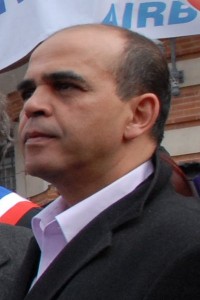The European Union signed the Anticounterfeiting Trade Agreement on January 26, but the treaty will require ratification from the EU Parliament before it enters into force, and ratification is not guaranteed. Parliament will debate ratification in June.
The EU Rapportuer for ACTA, Kader Arif resigned in protest over the signing, saying “I condemn the whole process which led to the signature of this agreement: no consultation of the civil society, lack of transparency since the beginning of negotiations, repeated delays of the signature of the text without any explanation given, reject of Parliament’s recommendations as given in several resolutions of our assembly.”
Meanwhile, thousands of people in multiple cities attended street protests against the trade agreement Poland and France.
Alarm about ACTA is growing in the United States as well. People who opposed the Stop Online Piracy Act and the Protect IP Act are turning their attention to ACTA and other vehicles of trade policy (like the TPP and Special 301) that promote TRIPS-Plus intellectual property . Examples include:
Rep. Darrell Issa, speaking at the World Economic Forum:
“As a member of Congress, it’s more dangerous than SOPA. It’s not coming to me for a vote. It purports that it does not change existing laws. But once implemented, it creates a whole new enforcement system and will virtually tie the hands of Congress to undo it.”
Harvard Professor Yochai Benkler, in a column titled “Seven Lessons from SOPA/PIPA/Megaupload and Four Proposals on Where We Go From Here.”
Rein in the international trade pathway for copyright extension. Another pathway, similar to criminalization in the sense that it harnesses federal functionaries to help the industry, distinct in the set of functionaries it harnesses, has been international trade. Through a set of trade agreements, both bilateral and multilateral, the U.S. government has pursued the passage of requirements more stringent than it could itself pass in the U.S. The recent adoption of SOPA-like laws in Spain is one example, as is the notorious Anti Counterfeiting Trade Agreement (ACTA). We need a law that would prohibit secret negotiation of IP-related provisions in international agreements, and a law that prohibits the U.S. from entering agreements that require of ourselves or our trading partners more restrictions on the public domain than then-current U.S. law permits.
Maira Sutton and Parker Higgins in the EFF Deeplinks Blog “We Have Every Right to Be Furious About ACTA.”
If there’s one thing that encapsulates what’s wrong with the way government functions today, ACTA is it. You wouldn’t know it from the name, but the Anti-Counterfeiting Trade Agreement is a plurilateral agreement designed to broaden and extend existing intellectual property (IP) enforcement laws to the Internet. While it was only negotiated between a few countries,1 it has global consequences. First because it will create new rules for the Internet, and second, because its standards will be applied to other countries through the U.S.’s annual Special 301 process. Negotiated in secret, ACTA bypassed checks and balances of existing international IP norm-setting bodies, without any meaningful input from national parliaments, policymakers, or their citizens. Worse still, the agreement creates a new global institution, an “ACTA Committee” to oversee its implementation and interpretation that will be made up of unelected members with no legal obligation to be transparent in their proceedings. Both in substance and in process, ACTA embodies an outdated top-down, arbitrary approach to government that is out of step with modern notions of participatory democracy.





